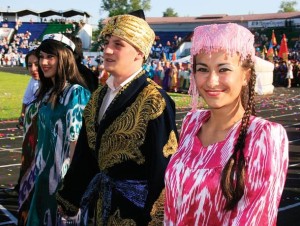Part of the tense, complicated crisis currently in Crimea is the role of an ethnic group indigenous to the Black Sea peninsula, the Crimean Tatars. Their history has made them side much more with Ukraine than with Russia in the current stand-off. They were forcibly removed by Stalin from Crimea, which they consider their ancestral homeland, and in the waning days of the Soviet Union, under Gorbachev, gradually began returning to Crimea. Today they represent some 12% of the population of Crimea. Having suffered persecution under both Czarist and communist Russia, the Crimean Tatars are understandably nervous about Crimea coming back under Russian control. In fact, until the recent arrival of Russian military units in Crimea, the Tatars were among the few groups outside Western Ukraine actively proclaiming their allegiance to the new Ukrainian government. According to a recent article in the New Republic, the Crimean Tatars are not likely to go along with an increasing Russification of the peninsula and may cause trouble for Putin’s possible plans to annex Crimea.
The Crimean Tatars differ from both Russians and Ukrainians in religion (Muslim) and language (Crimean Tatar). Their language belongs to the Turkic language family and is one of the treasured cultural traditions the Tatars maintained in exile. Today, however, living alongside other Crimeans speaking Russian and Ukrainian, there are fears that the language is endangered. Should the language die out, so would a crucial element of the group’s cultural identity and cohesion. In an interesting reflection of socio-political realities, the written language has gone through myriad transformations, from using Arabic script, to Turkic, to Cyrillian, to a Latin-based alphabet.
